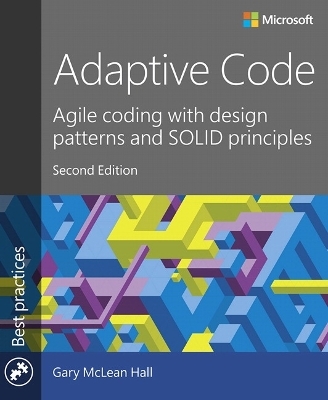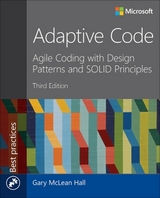
Adaptive Code
Microsoft Press (Verlag)
978-1-5093-0258-1 (ISBN)
- Lieferbar
- Versandkostenfrei
- Auch auf Rechnung
- Artikel merken
By applying this book’s principles, you can create code that accommodates new requirements and unforeseen scenarios without significant rewrites. Gary McLean Hall describes Agile best practices, principles, and patterns for designing and writing code that can evolve more quickly and easily, with fewer errors, because it doesn’t impede change.
Now revised, updated, and expanded, Adaptive Code, Second Edition adds indispensable practical insights on Kanban, dependency inversion, and creating reusable abstractions. Drawing on over a decade of Agile consulting and development experience, McLean Hall has updated his best-seller with deeper coverage of unit testing, refactoring, pure dependency injection, and more.
Master powerful new ways to:
• Write code that enables and complements Scrum, Kanban, or any other Agile framework
• Develop code that can survive major changes in requirements
• Plan for adaptability by using dependencies, layering, interfaces, and design patterns
• Perform unit testing and refactoring in tandem, gaining more value from both
• Use the “golden master” technique to make legacy code adaptive
• Build SOLID code with single-responsibility, open/closed, and Liskov substitution principles
• Create smaller interfaces to support more-diverse client and architectural needs
• Leverage dependency injection best practices to improve code adaptability
• Apply dependency inversion with the Stairway pattern, and avoid related anti-patterns
About You
This book is for programmers of all skill levels seeking more-practical insight into design patterns, SOLID principles, unit testing, refactoring, and related topics. Most readers will have programmed in C#, Java, C++, or similar object-oriented languages, and will be familiar with core procedural programming techniques.
Gary McLean Hall is a software developer, architect, and consultant with more than a decade of experience optimizing processes and practices in diverse Agile environments. He recently founded Igirisu to provide developer training for TDD, continuous integration, refactoring, design patterns, SOLID principles, and Git source control; cultural coaching towards Agile; and related services. His book, Adaptive Code via C# (Microsoft Press, 2014), has been translated into German, Japanese, and Korean, and won the Society for Technical Communications Distinguished Award in 2015.
Chapter 1 Introduction to Scrum
Chapter 2 Introduction to Kanban
Chapter 3 Dependencies and layering
Chapter 4 Interfaces and design patterns
Chapter 5 Testing
Chapter 6 Refactoring
Chapter 7 The single responsibility principle
Chapter 8 The open/closed principle
Chapter 9 The Liskov substitution principle
Chapter 10 Interface segregation
Chapter 11 Dependency inversion
Chapter 12 Dependency injection
Chapter 13 Coupling, cohesion, and connascence
| Erscheinungsdatum | 28.04.2017 |
|---|---|
| Reihe/Serie | Developer Best Practices |
| Verlagsort | Boston |
| Sprache | englisch |
| Maße | 185 x 226 mm |
| Gewicht | 720 g |
| Themenwelt | Mathematik / Informatik ► Informatik ► Netzwerke |
| Informatik ► Programmiersprachen / -werkzeuge ► NET Programmierung | |
| Mathematik / Informatik ► Informatik ► Software Entwicklung | |
| ISBN-10 | 1-5093-0258-1 / 1509302581 |
| ISBN-13 | 978-1-5093-0258-1 / 9781509302581 |
| Zustand | Neuware |
| Haben Sie eine Frage zum Produkt? |
aus dem Bereich



